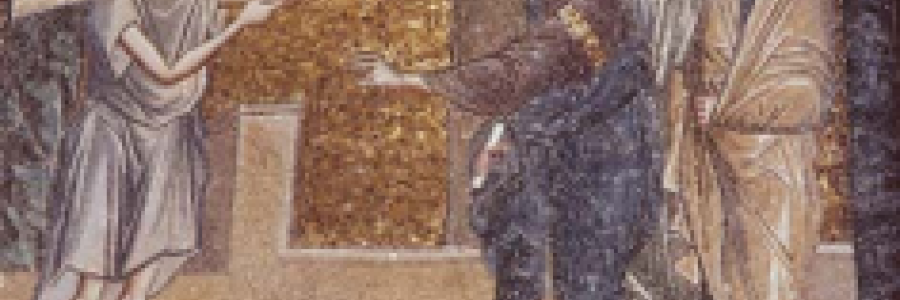Jesus & the Sad, Angry Little Men (Mark 3:1-6)
Read the rest of the series.
This is a sad little story, because we see sad little men rejecting their great God and Savior, Jesus Christ. They have made void the word of God through their tradition (cf. Mk 7:13). In the Gospel of Mark, Jesus’ early confrontations with the Pharisees come quickly, one after the other. This particular account is where the water boils over.
Discussion
Chiasm in 2 Kings 4 and in General
Introduction
One great resource that uncovers an inverse parallelism in the Old (First) Testament is Dave A. Dorsey’s book, The Literary Structure of the Old Testament (Baker, 1999). This is a must have for anyone serious about interpreting and teaching the Old Testament.
Chiasm or chiasmus is a writing structure, defined by Wikipedia:
Chiastic structure, or chiastic pattern, is a literary technique in narrative motifs and other textual passages. An example of chiastic structure would be two ideas, A and B, together with variants A’ and B’, being presented as A,B,B’,A’.
Discussion
Theology Thursday - Anathema! The Council of Trent on Justification
Following the deep division in the church which had resulted from the Protestant Reformation, there was a widespread desire, which grew stronger and was expressed in a variety of ways, for an ecumenical council. Its aim would be to reject errors against faith, add strength to the official teaching, restore the unity of the church, and reform the standards of the Roman curia and of church discipline.1
SIXTH SESSION, held January 13, 1547.
Decree on Justification2
CANON 1. If any one saith, that man may be justified before God by his own works, whether done through the teaching of human nature, or that of the law, without the grace of God through Jesus Christ: let him be anathema.
CANON 2. If any one saith, that the grace of God, through Jesus Christ, is given only for this, that man may be able more easily to live justly, and to merit eternal life, as if, by free-will without grace, he were able to do both, though hardly indeed and with difficulty: let him be anathema.
Discussion
The Mosaic Covenant & Other Covenants
Read the series so far.
The Mosaic Covenant as a Historical Placeholder for Other Covenants
If the commandments in the “Ten Words” on Sinai (Exod. 20) and all those that followed in their train were too stringent for a fallen people to keep, at least the covenant God made with Israel, and which they voluntarily entered into (in Exod. 24), distinguished them among the other nations of the world. It did this to the extent that they were preserved as a distinct people in continuity with Abraham, Isaac and Jacob.1
Just as the Noahic covenant guarantees the perpetuation of the regulation and predictability of the rhythms of nature, thereby creating the stage of history for God’s program to play out upon, the Mosaic covenant acts to set the covenants with David and Phinehas within a theocratic outlook—even if both of these covenants transcend the temporary “old covenant” and are embraced by the coming New covenant. Another way to say this is to imagine the people of Israel as connecting the Mosaic covenant to the New covenant brought upon Israel at Christ’s return (Isa. 61:2b-3; Jer. 31:31-37); a covenant that supersedes the old one, but without morphing the promises God made out of all recognition.



Discussion